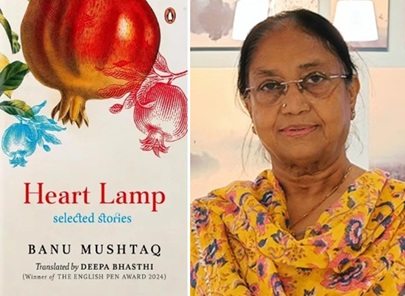Feb 22, 2026
Feb 22, 2026
by Varala Anand
When stories build their nests, they do not choose pages they choose hearts. That is what Banu Mushtaq’s writing has done for over half a century. And now, the world has turned its gaze toward her gentle yet unflinching voice as she got the 2025 International Booker Prize for her remarkable collection Heart Lamp, translated from Kannada into English by Deepa Bhasthi. This recognition is more than a personal triumph.
It is a luminous moment for Kannada, and for all Indian regional literatures that have quietly carried the pulse of human truth for generations.
“Writing is not merely the work of a pen; it is an effort born from the heart.” said Banu Mushtaq Born in 1948 into a modest Muslim family. Banu Mushtaq began writing in 1970, an era when the Bandaya (Rebellion) literary movement was shaking Kannada letters awake with the voices of the marginalized. Amidst those defiant echoes, hers rose as a distinctly feminine, fearless voice steady, reflective, and piercingly humane.
Her stories question the inherited hierarchies of caste, class, and gender not with anger alone, but with a quiet insistence on dignity. They ask how justice breathes in a fractured world, how women hold their ground in the soft tyranny of daily life.
Before becoming a writer, Banu studied law and in court rooms she found the stories that would later fill her fiction. The same hands that turned case files also turned pages of compassion. She fought for those unheard by the system, and in her tales, those forgotten lives began to speak.

Over the years, she has published six short story collections, one novel, an essay volume, and a book of poems earning honors such as the Karnataka Sahitya Academy Award and the Dana Chintamani Attimabbe Award. But her truest reward lies in the human voices she resurrected through her pen. The Flame Called “Heart Lamp” gathers twelve of her most enduring stories written from 1990, chosen from more than fifty. The collection glows with the warmth of lived experience and the ache of memory. Each story is a flicker sometimes tender, sometimes searing illuminating the ordinary heroism of everyday women.
Her debut story itself startled readers with its raw portrayal of a woman’s inner storm the unspoken, the unshed, the unresolved. From that moment, her writing became a window into the hidden worlds within women, the politics of religion, the uneven rhythm between rural and urban life, the longing for justice, and the fragile desire for freedom. Her prose is deceptively simple like clear water through which you glimpse great depths. Beneath that clarity lie questions that have no easy answers.
Banu once dreamt of becoming a doctor. But somewhere between textbooks and human pain, another calling began to stir within her the call to heal with words. She left medicine to listen to that inner voice. The world of literature is richer for that decision.
A Light for the Voiceless Upon receiving the Booker, she said: “It is an honor to stand among these great writers. When we accept differences and celebrate one another, unity finds its way to live among us. Every story carries its own light may that light reach the many still-hidden voices in the dark.” Speaking about her mother tongue, Banu said “Kannada is a language that sings protest and deep emotion. To write in it is to blend faith with intimacy”
Heart Lamp is built from the lives of Muslim women and girls of South India their silences, their courage, their daily negotiations with power. Within these stories, one hears echoes of inequality and resistance, tenderness and rebellion, despair and hope. These are not simply stories written over thirty years they are the testimonies of a woman who fought for women’s rights, who turned law into empathy, and who shaped justice into art.
Deepa Bhasthi’s translation, too, breathes with the same sensitivity a dialogue between two hearts across languages.
Banu once described her craft in words that could define her entire oeuvre “My writing is like a face-to-face conversation. I sit beside people at their table, speaking of family joys and sorrows, of what the world is becoming with nothing between us but truth.”
A Universal Light When the judges announced the award, they said “Though Banu Mushtaq’s stories are rooted in their region, the emotions they reveal are universal. Her work shows how deeply the human mind can be understood. Her success brings dignity to Kannada literature and inspiration to all regional voices of India. Through translation, they too can reach the world.” And perhaps that is what Heart Lamp truly is — not merely a collection of stories, but a quiet revolution of empathy. A reminder that every tale, no matter how small, can glow like a lamp and nest forever in the human heart. Heartfelt congratulations to Banu Mushtaq the luminous keeper of the Heart Lamp.
25-Oct-2025
More by : Varala Anand